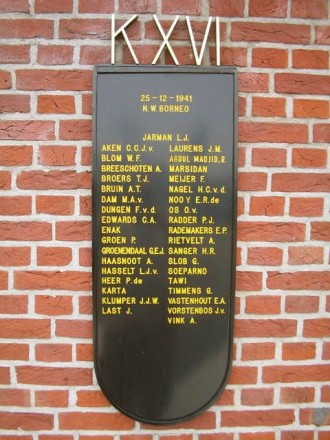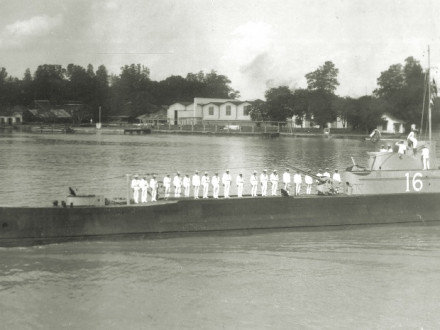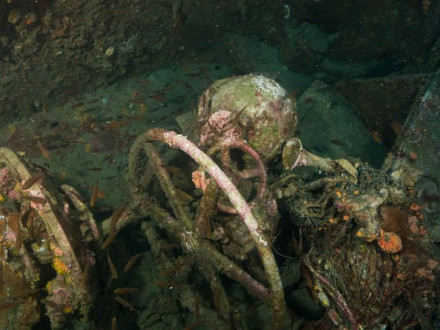History
Construction
In 1930, construction started on the submarine Hr. Ms. KXVI at the Rotterdamse Droogdok Maatschappij shipyard (RDM). The ship was intended for service in the former Dutch East Indies. The KXVI was launched on April 8th, 1933 and commissioned on January 30th, 1934. On Jauary 7th, 1935, the KXVI left for the Dutch East Indies from Den Helder.
War with Japan
In November 1941, Japan was about to invade the colony. The KXVI was assigned to a group with two other submarines which were stationed at Borneo, for it was expected that the Japanese troops would land here.*
On December 24th of that year, during the Battle of Borneo, the Japanese destroyer Sagiri was sighted by the KXVI. Two torpedoes fired at the Japanese vessel hit target and the ship was sunk. KXVI's success, however, was short-lived. The next day at 11:45, not far from the previous skirmish, the KXVI was hit by a Japanese torpedo fired from the submarine I-66. The Dutch submarine and all 36 of her crew members were lost.

Documentary on the search for the Hr. Ms. KXVI by the Foundation for surviving relatives of Dutch Submarines.
Discovery
Since 2003 the Foundation for surviving relatives of Dutch World War II submarine crewmen has attempted to locate the wreck of the KXVI. After many unsuccessful attempts, a wreck was finally found by sports divers in October 2011, lying bow upright on the sand at a depth of 45 meters in the South China Sea. Expert assessment by the Royal Netherlands Navy confirmed that the wreck was that of the KXVI.

*) This Onderzeeboot Divisie III ('Submarine Division III') consisted of the Hr. MS. KXIV, KXV, KXVI and KXVII. Because of the threat of war, the division was moved to Tarakan in November 1941.
Description
Yard: Rotterdamse Droogdok Maatschappij , Rotterdam
Type: KXIV class
Armament:
8x 21" torpedoes
1x 8.8 cm canon
2x 40 mm machine guns
The ship was laid down on May 31st 1930 and launched on April 8th 1933. It was commissioned on January 30th 1934

| Master | Jarman, Jan |
|---|---|
| People on board | 36 |
| Speed | 17 knots ~ 20 mph (31 km/h) |
| Speed submerged | 9 knots ~ 10 mph (17 km/h) |
| Length | 241 ½ feet (73.6 m) |
| Width | 21 ¼ feet (6.5 m) |
| Draft | 12 ½ feet (3.8 m) |
| Displacement | 865 ton |
| Displacement submerged | 1045 ton |
Status
Research in 2024
Even though the wreck of the KXVI is a designated war grave, World War II wrecks such as this one are under constant threat of being commercially salvaged.
The Netherlands and Malaysia have done maritime archaeological research on the locations of the wrecks of the Hr. Ms. KXVI and O20. This was a close co-operation between the Ministries of Defence, Culture and Foreign Affairs of both countries and it was headed by the Cultural Heritage Agency of the Netherlands (RCE).
The O20 was found in its expected location, but it turned out the KXVI had been illegally salvaged. On this location, a wreck was no longer found, only moved ground and plates of iron that had been left around as well as other objects, probably from the salvaging activities as well as from the submarine.

The iron of these ships is valuable and sought after. It is of an exceptional quality because it was manufactured before nuclear weapons were detonated in the atmosphere before 1945. Because of this, the iron has not been exposed to radioactivity and it has a very low background radiation - making it useful for specialist measuring equipment among other things.
References
- RCE.
onderzoek gezonken onderzeeboten in Maleisische wateren. - Münching, L.L. (1978).
Schepen van de Koninklijke Marine in de 2e wereldoorlog.
pp 44, 45. - Wilco Vermeer.
Traces of War. - RCE.
Onderzoek gezonken onderzeeboten in Maleisische wateren. - SNO.
KXVI.